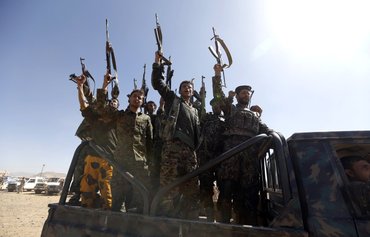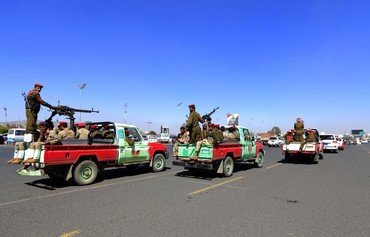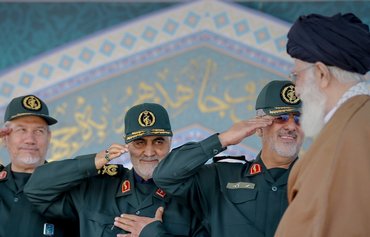The killing of Islamic Revolutionary Guards Corps Quds Force (IRGC-QF) commander Maj. Gen. Qassem Soleimani will have negative repercussions on the military capabilities of the Houthis (Ansarallah), Yemeni analysts said.
The loss of Soleimani will serve as a severe setback to the Yemeni militia's desire to continue the implementation of its expansionist plans, as well as those of the Iranian regime, they told Al-Mashareq.
The US on January 3rd announced it had killed Soleimani, alongside Iraqi Popular Mobilisation Forces deputy head Abu Mahdi al-Muhandis, in a strike on their motorcade at Baghdad International Airport.
"Soleimani's killing is a great loss for Iran and for its proxies in the region, especially the Houthis in Yemen," Abaad Centre for Studies and Research director Abdul Salam Mohammed told Al-Mashareq.
![A fighter loyal to Yemen's Houthis mans a machine gun turret in the back of a pickup truck during a tribal meeting in Sanaa on September 21st. [Mohammed Huwais/AFP]](/cnmi_am/images/2020/01/08/21849-yemen-houthis-sanaa-600_384.jpg)
A fighter loyal to Yemen's Houthis mans a machine gun turret in the back of a pickup truck during a tribal meeting in Sanaa on September 21st. [Mohammed Huwais/AFP]
Soleimani "owned Iran's expansion project in the region and was responsible for its management and planning, in addition to overseeing the implementation of its military plans and supplying [its proxies] with arms through smuggling", he said.
"Soleimani is the person who subjected four Arab capitals to Iranian influence through its militias in those countries," he added, noting that his killing was "shocking news for Iran and its proxies in the region".
Major setback for the Houthis
As for the direct impact on the Houthis, Mohammed said Soleimani had exercised a great deal of influence with regard to the Houthis' operations and expansion in Yemen, which he oversaw from the start.
He also played a key role in determining their operational strategy, and provided them with logistical support, weapons, money and experts, Mohammed said.
Soleimani placed great importance on the Houthis, he said, because through them, Iran sought to tighten its control over the region's waterways.
By way of the Houthis, he said, Iran -- which is positioned on the Strait of Hormuz, the gateway to the Arabian Gulf -- hoped to gain control over the strategic Bab al-Mandeb strait, at the entrance to the Red Sea.
By carrying out attacks on Iran's rival, Saudi Arabia, the Houthis serve Iran's interests more than its counterparts in other countries of the region, he added.
From the Houthis' perspective, Mohammed said, the IRGC-QF commander's killing is seen as "a major setback and loss".
"If the Houthis recklessly back Iran's calls to respond to Soleimani's killing and compromise US interests, they will face direct US strikes, and the loss will thus become double," he said.
As for those who succeed Soleimani, Mohammed said, other Iranian military leaders will be in a state of caution for fear of meeting the same fate, and this will weaken the Houthis as well as other IRGC-affiliated groups in the region.
"The same applies to Houthi leaders," he said, noting that if they choose to retaliate against US interests in the region, their leaders may face the same fate as Soleimani.
Even so, political analyst Wadih Atta told Al-Mashareq, the Houthis will do "everything they can to prove their loyalty" to the Iranian regime.
'Confusion at all levels'
Soleimani was "the mind behind the Houthi movement, planning all its wars and also supervising the assassinations in Sanaa, including the actions of the coup in September 2014", political analyst Faisal Ahmed told Al-Mashareq.
His importance to the Houthis can be seen in the reactions of its leaders, including Abdul-Malik al-Houthi, who have stressed the importance of a response to Soleimani's killing, Ahmed said.
Soleimani's killing will have marked "the beginning of the collapse of the Houthis, since he oversaw their military plans for attacks on Saudi sites as well as the battle for Sanaa", he said.
He supervised the training of the militia's leaders, "whether in Iran or by sending experts to them and providing them with modern technologies, such as drones and missiles, facilitating the success of their attacks on Saudi sites", he said.
These attacks included economic and military targets, and also killed innocent civilians, Ahmed noted.
"When any movement suddenly loses the person supporting it, it loses half of its power because it will experience confusion at all levels," he said.
Following the death of Soleimani, "we will witness a gradual decline in Houthi military capabilities, even if they try to show the opposite by carrying out military operations with missiles", Ahmed said.

![A Yemeni man walks beneath a poster of slain Iranian military commander Qasem Soleimani in Sanaa on January 8th. [Mohammed Huwais/AFP]](/cnmi_am/images/2020/01/08/21853-Yemen-man-Soleimani-600_384.jpg)






